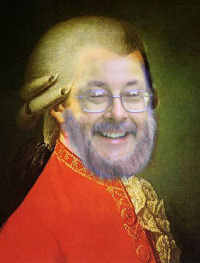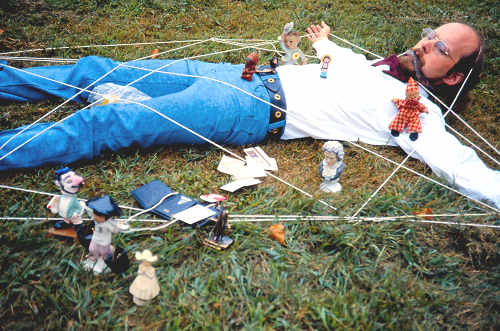A 365-Day Project
"We Are All Mozart"
A project to create
new works and change
the perception of the
music of our time.


 July 21, 2006
July 21, 2006 
To generalize is to be unjust, and yesterday generalizations infested my commentary. No, I don't retract them, but there are implications that need more exploration.
To explain: Are yesterday's comments calling for a lowering of expectations? How was it in earlier times? As to the latter, I repeat that I am no musicologist, even though I have followed the usual course of study with musicologists (among them Edmond Strainchamps and Martin Picker) and as an interested composer pursued the performance and direction of music from the late Gothic through the high Baroque. What can be found throughout those eras -- and into the 150 years less familiar to me beginning in 1750 -- is an enormous amount of utility music imbued with high standards of composition and considerable creative movement.
The rise of the Enlightenment composer was a slow process. The church lost its hold, and the investigation of large secular forms began a shift away from utility music. (My use of 'utility music' is more generic and ambiguous than the Gebrauchsmusik identified with Paul Hindemith, and the balance of utility and abstraction overlaps substantially.) Utility music has been eclipsed by masterpieces, despite the composition of utility music by major composers into our own time. What has changed is its perception as a lower species of music.
I object to this perception, but its presence as a subtext to classical music concerts and nonpop composers' thinking has damaged composers' visibility. As I wrote in June, Milton Babbitt's legendary 1958 "Who cares if you listen?" was a proclamation of a fall from musical innocence, but more than that, it was a withdrawal from the public realm, for in seventy years composing over 125 pieces, he created just a few (probably Three Theatrical Songs, Fanfare For All, and Bicenguinguagenary Fanfare) that could be considered utility music -- and influenced two generations of composers to emulate that public inaction.
This is not a slam on 'Uncle Milty,' my favorite used car salesman of new music whose marketing sessions I would slip into during my years in New Jersey, as I pretended to be a student. Babbitt's work is neither impenetrable nor unlovable. Despite its apparent intentions, it is even passionate. But passion is not the topic today. Rather, it is utility -- and utility is simply alien to Reflections for Piano & Tape.
So we have worked diligently to make ourselves useless artists. That's not good, because our ownership of utility music has been given away. Where is our utility music today? In film and television, in churches (concretized into standard hymns and chants and calls to prayer, and supplemented by poorly composed faux-modal monody for the Catholic ritual, and various pop streams represented by gospel choirs and worship teams), and emanating from a thousand million little loudspeakers reproducing compressed pop classics and classical pops.
Phew. We have not done well.
So were my comments about creating our own individual recording and distribution a simple acknowledgment of the situation, a kind of exhalation of acceptance after all the denial, anger, bargaining, and depression?
Not at all. They were about, to use the overused cliché, empowerment. There is no time in the history of music when an individual composer has had the ability to compose, draft, engrave, edit, print, publish, distribute, demonstrate, record, market, and travel with almost complete confidence in the music being properly represented. It doesn't mean it's easy, but it is both possible and desirable in an increasingly online world.
The nonpop music world still bucks the online concept. Publishers (and composers, for that matter) continue to place so much value upon the physical object that they do not recognize the dramatic easy availability of music through online sources. The push-pull argument over recorded music has been resolved after a decade's wrangling: "I got it for free." "Can't have it for free anymore." "I want it for free." "Can't have it." "Then I'll get something else for free." Boom. A few years of Napster and KaZaa brought the old school to its knees, and soon iTunes were popping down the superhighway for under a buck. Did that devalue the song, that 99-cent special? Hardly. It increased availability and distribution and offered the features that listeners demonstrated a desire for from the days of stacking up a mongrelocracy of 78s and 45s on record changers through cassette mixes and CDs in random mode to iPod shuffling.
But music publishers still sell the paper. It's a ready-made convenience for buyers, and lends a certain leftover credibility from the old days when a publisher was actively involved in the editing of a work, and it still gives a certain stamp of typographical style and legibility. Now many major publishers reprint composer-supplied materials. What's the value added in this process if the composer has typeset and proofread the music? And some publishers still rent sheet music. If orchestras weren't such hidebound conservatives, their librarians and directors would be all over downloading scores that they could keep in multiple refreshable copies and pay only royalties to use. But that change is very slow. The value must be demonstrated. Composers are initiating the change. Visibility helps. So do good websites, self-marketing, appearance at trade shows, nice logos, and care taken with acoustic or electronic demos. And of course a well-prepared, accurate score and legible parts with logical page turns also help.
Yet some composers still believe their work has ended when they sign the pencil score. Those days are over. Please wave good-bye. You are richly empowered but you are also more greatly responsible.
Responsibility is why the question of utility music still hangs in the air. It is hard not to step into the mucky field between utility music and Splenda music. As I demonstrated a few days ago, cooking up some special-occasion utility Splenda is easy. Creating more substantial utility music is not -- and may in fact be harder for a generation or two of composers whose main contact with performances was in a concert hall. (Somehow Wagner managed to get all those performers at the bottom of the staircase to perform Siegfried Idyll, his wife Cosima's birthday present. Damn good stage manager, lots of experience, and effective at what computer geeks would call 'scalability'.)
Who else wrote utility music after the Romantic era? Gustav Holst (including the lovely carol In the Bleak Midwinter), Ralph Vaughn Williams (the rhythmically clever For All the Saints, now a hymnbook standard), Dmitri Shostakovich (The Age of Gold, with the luscious soprano saxophone in the Adagio), Igor Stravinsky (the brilliant miniature Fanfare for a New Theatre), Arnold Schoenberg (the rarely heard but startlingly appropriate Music for a Film Scene). Utility theatre and especially dance music were everywhere by the 1970s, and film music by nonpopsters Michael Nyman (The Cook the Thief His Wife & Her Lover) and Philip Glass (Koyaanisqatsi and even Battlestar Galactica -- I'm not kidding) was inescapable. Composers such as Laurie Anderson, Eric Salzman, Howard Fredrics, Mary Elizabeth, Barry Drogin, Michael Sahl, Daron Hagen, Beth Anderson, Gwyneth Walker and even Robert Ashley evidence a rebirth of theatrical thinking, and act upon it to create skilled, well-conceived utility music.
What almost all these composers have in common, save for Schoenberg, is a kind of populism. Some would say unashamedness. Jeffrey Cotton would doubtless accuse the latter crowd of being part of the 'grueling Rococo'.
Great music is a strange blending, and I use 'great' without reservation. Artificial intelligence experts and post-Wittgensteinians would lead us down the convoluted and endless path of doubt, but my definition is typically simple: Great music is a sonic blend of the new and the known with the raw and the skillful and with the personal and the communal that together enhance its ability to speak with enough of a unique and convincing voice both to make it part of and to take it out of its own time and place.
This matrix is so difficult to imagine that it seems intuitive: "I know it when I hear it." Because we are not endowed with multidimensional conceptual powers, intuition and experience substitute. But imagine three three-dimensional worlds that overlap in a higher dimension.
The new and the known, for example, do not form a simple sliding scale but envelop a point of substance in a three- (almost four-) dimensional space inhabited by moving and overlapping three-dimensional areas of known elements (handling of melody, harmonic, rhythm, texture, color, length, technique, style, etc.) and unknown (empty or 'novel') space. For a particular time and place, that point becomes significant because it is neither far out in the uncharted regions of anomalousness nor overcome by the clouds of similar points. (Whether the new point quickly blinks out is another discussion, that of newness vs. novelty.)
Likewise, the raw and the skillful are malleable in a space of height, width, depth and time, with examples of skillfulness from one time and place presenting themselves as the opposite elsewhere. This is easy to conceptualize but difficult to identify by example. One might consider the John Cage works for prepared piano, out of whose brutal crudeness of preparation arises a magical world of proximate gamelan. The relationship between Cage and ur-gamelan or Darius Milhaud and ur-jazz is relatively slight, and to practitioners of the urs, unskilled. Before certain times, skill is insufficient; after the same times, skill is irrelevant -- as in writing Mozart's 41st symphony today.
The personal and the communal are similarly problematic, even moreso because of a composer's acculturation. How much is surface rebellion? Rebellion of interiors? Rebellion of subtext? How much is direct reference, indirect reference, suggestion? In the bulge of alienating contemporary nonpop in the mid-20th Century, the personal had overcome the communal to create self-standing objects of personal expression -- into which theoretical expression (such as total serialism, performance art, or acousmatics, for example) could be blended, particularly if those theories were unique to a composer or small stylistic school. The personal and the communal once again protrude into each other at a higher dimension.
Within this multidimensional matrix of greatness it becomes possible to calculate (meaning in human terms to intuit, feel, sense, understand, grasp, 'know when you hear') why music is great or not, and consequently why excellent new ideas & approaches become so quickly stale.
You'll note that I do not include utility music in this matrix. Utility music can take on the mantle of greatness by its place in the matrix, not its purpose. This is significant. It means that the spurning of utility music by nonpop composers with a greatness in their pens and keyboards is a mistake of enormous proportion. It pollutes the historical timeline and often leaves it to polar opposites -- the academy and the marketplace -- to proclaim greatness for us. The tools of experience are denied the larger public.
If there is any flaw in the influence of a self-actualized nonpop composer of the internet era, it is stratification. Another day for that. In the meantime, composers must give more time to creating utility music.

Utility music in progress: David Gunn prepares Ten Elves from Sorrento for presentation, ca. 1977.